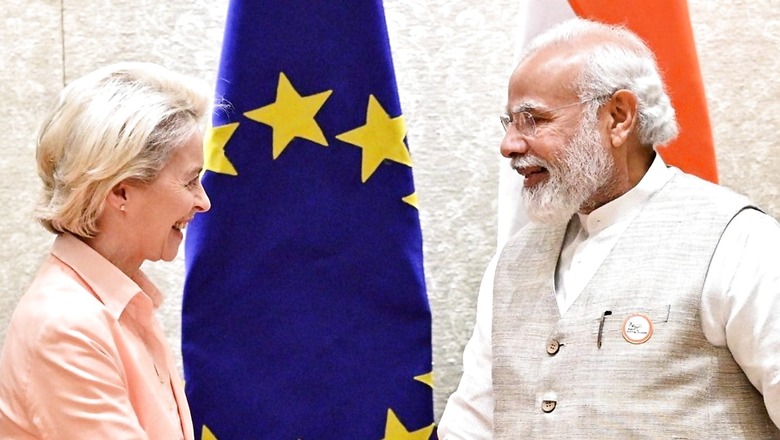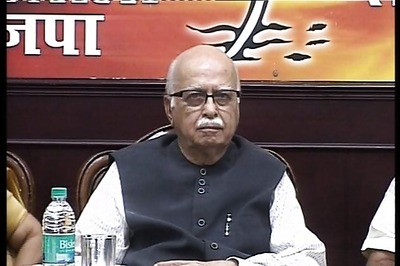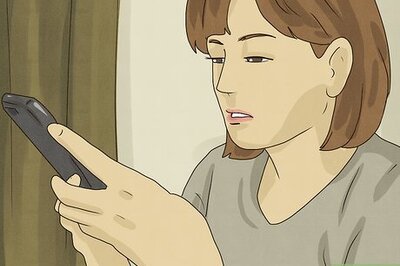
views
European Commission President Ursula von der Leyen and Prime Minister Narendra Modi agreed to establish the EU-India Trade and Technology Council during a meeting in New Delhi on April 25.
This comprehensive coordinating structure will enable both partners to address difficulties at the intersection of commerce, trusted technology and security, allowing the EU and India to increase collaboration in these areas.
“We are confident that the shared values and common interests of the EU and India offer a strong basis to intensify mutually beneficial and deeper strategic cooperation,” said a joint statement released after the meeting.
Strengthening the ???????????????? partnership is a key priority for this decade.We will step up cooperation in trade, technology and security.
This is why I’m pleased that @narendramodi and I will establish an ???????????????? Trade and Technology Council.
— Ursula von der Leyen (@vonderleyen) April 25, 2022
It was also clearly noted in the statement that amid rapid developments in the geopolitical landscape, both sides agreed to this collaboration, underscoring the need for coordinated in-depth strategic interaction.
In the case of the ‘Council’, it will provide the political direction and structure needed to operationalise political decisions, coordinate technical work and report back to the political level on implementation and follow-up in areas critical to the European and Indian economies’ long-term success.
The decision to establish a Trade and Technology Council will be India’s first with any of its partners and the EU’s second after the one it established with the United States.
“Establishing the EU-India Trade and Technology Council is a key step towards a strengthened strategic partnership for the benefit of all peoples in the EU and India,” the statement further added.
The EU and India have had a close partnership for decades. The EU is India’s third-largest commercial partner, with goods trade at $67.8 billion (more than Rs 52,00,00,00,00,00).
As per the statement, it is understood that both sides are determined to increase joint efforts to address current challenges and geopolitical circumstances.
It was reported earlier that Leyen would seek to increase sales of European military equipment to India while also resuming negotiations on a free trade agreement during her meeting with Modi.
Free trade talks were halted in 2013 due to disagreements over tariff reductions and patent protection and have not progressed considerably since a virtual summit between the EU and India in May 2021.
Leyen arrived in India on April 24 and it is her first visit as the president of the European Commission. Her visit is part of a Western campaign to persuade India to cut ties with Russia in the aftermath of the Kremlin’s invasion of Ukraine and follows British Prime Minister Boris Johnson’s visit last week.
In this current situation, when Russia is at war against Ukraine and several countries in the West have been following strong measures against Kremlin, both the EU and the United States are attempting to strengthen ties with India, which is the world’s largest importer of Russian armaments.
“There are a whole host of Western leaders reaching out to India right now to see what alternatives we can provide. The key is that we want to bring forward this relationship, work on technology together and bring India into our camp, that’s the main message of our visit,” media reports quoted a senior EU official as saying.
However, there is another reason for seeing India as the best option available. The EU views the country as a critical ally in managing China’s transformation from a friendly commercial partner to a competing state with a growing military footprint.
After PM Modi met with Boris Johnson last week, both agreed on a new and expanded India-UK defence partnership. Both leaders also reportedly discussed next-generation defence and security collaboration, including support for the development of indigenous fighter jets.
It was also said that by strengthening commercial and defence connections, Johnson was expected to assist India is moving away from its reliance on Russia.
Meanwhile, a top US ambassador has warned China that if it provides “material support” to Russian President Vladimir Putin’s conflict in Ukraine, it will face penalties, while at the same time promising to assist India in weaning itself off Russian arms.
Last week, at an event in Brussels, US Deputy Secretary of State Wendy Sherman claimed that China was not helping the situation in Ukraine by magnifying Russian disinformation operations. She expressed optimism that Beijing will take the “correct lessons” from Russia’s conflict, such as the fact that it cannot separate the US from its allies.
At an event, hosted by a group ‘Friends of Europe’, which was co-funded by the EU, Sherman said the US would work with India to help the country move away from its traditional reliance on Russian weapons, given the impact global sanctions are having on Russia’s arms industry.
However, when Union Finance Minister Nirmala Sitharaman recently went to the US and attended the meetings of the International Monetary Fund and the World Bank, she said that following the Ukrainian war, the bilateral relationship between India and the US has progressed, with more and more doors of opportunity opening.
While talking to the media, she also said: “But there is also an understanding, not just the legacy dependence for defence equipment on Russia…that India has legacy issues as much as relationships over several decades. And if anything, I can say with a bit of confidence there is a positive understanding. It is not a negative understanding.”
“I see more and more windows of opportunities opening, rather than (US) keeping an arm’s distance saying you’ve calibrated your position on Russia doesn’t seem like you are getting closer to us,” the minister added.
Read all the Latest India News here
















Comments
0 comment